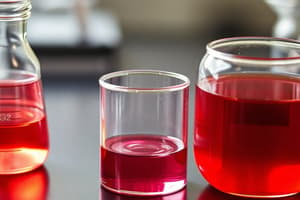Podcast
Questions and Answers
What characterizes a homogeneous mixture?
What characterizes a homogeneous mixture?
- It has a uniform composition throughout. (correct)
- It can be easily separated into its components by hand.
- It only contains one phase.
- It consists of visible different particles.
Which separation technique relies on differences in boiling points?
Which separation technique relies on differences in boiling points?
- Decantation
- Distillation (correct)
- Evaporation
- Filtration
Which of the following is an example of a heterogeneous mixture?
Which of the following is an example of a heterogeneous mixture?
- Air
- Saltwater
- Pasta sauce (correct)
- Sugar solution
What principle does the filtration technique primarily rely on?
What principle does the filtration technique primarily rely on?
What process is commonly used to remove solvents from solutions?
What process is commonly used to remove solvents from solutions?
Flashcards
Homogeneous Mixture
Homogeneous Mixture
A mixture with a uniform composition throughout. This means that the components are evenly distributed and cannot be easily distinguished.
Heterogeneous Mixture
Heterogeneous Mixture
A mixture with a non-uniform composition. The components are not evenly distributed and can be easily identified.
Filtration
Filtration
A technique used to separate solid particles from a liquid, based on their difference in size. The mixture is passed through a filter, allowing smaller particles to pass through while larger particles remain trapped.
Distillation
Distillation
Signup and view all the flashcards
Decantation
Decantation
Signup and view all the flashcards
Study Notes
Homogeneous Mixtures
- Mixtures with a uniform composition throughout.
- Examples include air and sugar water.
Heterogeneous Mixtures
- Mixtures with a non-uniform composition.
- Different particles are visible in the mixture.
- Examples include pasta sauce, sand and water, and trail mix.
Filtration
- Separates solids from liquids.
- Based on differences in the state (solid/liquid) and size of components.
- Uses a filter with specific pore sizes.
- Particles smaller than the pores pass through the filter.
- Example: separating sand from water.
Evaporation
- Separates fluids or soluble substances from a solution.
- Relies on differences in boiling points.
- Example: drying clothes or hair.
Distillation
- Separates liquids based on differences in their boiling points.
- One liquid evaporates and condenses in a cooler area for collection.
Decantation
- Separates a liquid from a solid by pouring off the liquid.
- Relies on the difference in density between the liquid and solid.
Studying That Suits You
Use AI to generate personalized quizzes and flashcards to suit your learning preferences.





